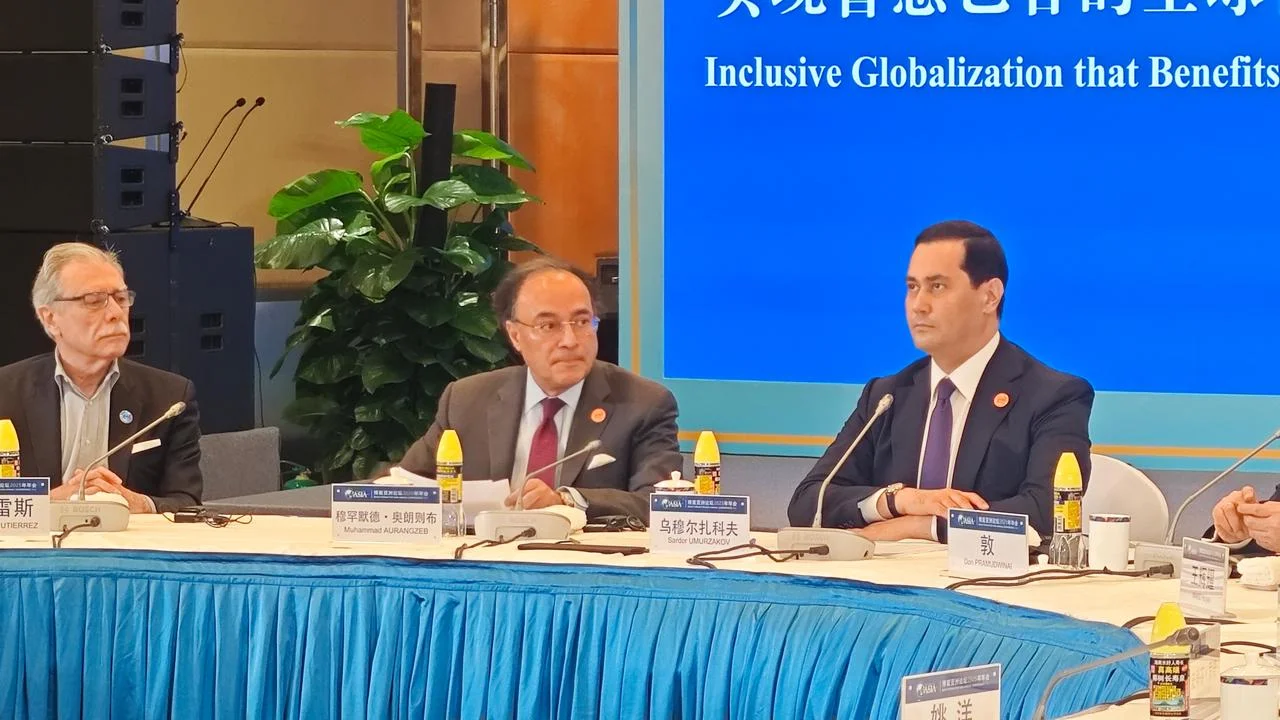Islamabad, Mar 26, 2025: Federal Minister for Finance and Revenue, Senator Muhammad Aurangzeb, has underscored the critical need for a fair and inclusive approach to globalization one that ensures equal opportunities for all nations, particularly those in the developing world.
Speaking at the Boao Forum for Asia Annual Conference 2025 in Hainan, China, the Minister participated in a high-level session titled ‘Inclusive Globalization That Benefits All Pathways and Actions.’
He highlighted that while globalization has lifted over a billion people out of poverty, it continues to favor developed nations, leaving emerging economies struggling with trade barriers, financial constraints, and limited market access.
Finance Minister Aurangzeb warned that increasing protectionist policies, unilateral trade decisions, and economic rivalries are deepening global inequalities.
READ MORE:
Pakistan & Italy Eye Joint Ventures for Energy Collaboration
He stressed that for globalization to remain sustainable, it must be restructured to provide a level playing field, particularly for developing nations that face challenges due to restrictive trade regulations and limited financial inclusion.
The Minister called for immediate, concrete actions rather than mere rhetoric. He outlined Pakistan’s commitment to fostering a more equitable globalization model one driven by multilateral cooperation, fair trade practices, and sustainable economic development.
He cited initiatives such as the China-Pakistan Economic Corridor (CPEC) and the Special Investment Facilitation Council (SIFC) as crucial steps toward enhancing regional connectivity and economic growth.
A key issue Senator Aurangzeb addressed was the widening wealth and technology gap between developed and developing economies.
Advanced nations benefit from digital trade, financial markets, and technological advancements, while emerging economies face high tariffs, strict investment conditions, and inadequate infrastructure.
He called for stronger international collaboration to facilitate market access, trade fairness, and inclusive growth.
The Minister also urged developing nations to form global alliances to demand fairer trade regulations and increased representation in international financial bodies.
He highlighted Pakistan’s textile and agriculture sectors, which face significant export barriers due to protectionist policies and non-tariff restrictions imposed by developed countries.
READ MORE:
Pakistan’s relations with US are integral part of foreign policy: Yousaf Raza Gilani
Addressing financial disparities, Senator Aurangzeb stressed the need for debt relief and restructured sovereign debt systems to prevent recurring economic crises in developing nations.
He pointed out that global debt levels exceed $100 trillion, with over 60% of low-income countries at risk of default.
He called for urgent reforms in financial institutions to provide emerging economies with greater financial flexibility and sustainable debt solutions.
Finance Minister Aurangzeb also emphasized the transformative role of technology in reducing economic inequality. He advocated for international initiatives to support digital inclusion, particularly in AI, fintech, and e-commerce.
Which can empower small and medium-sized enterprises (SMEs) in countries like Pakistan. He highlighted Pakistan’s Digital Pakistan initiative and called for expanded global collaboration in technology-driven economic participation.
On climate change, the Minister reiterated that developing nations bear the brunt of environmental crises despite contributing minimally to global carbon emissions. He noted that Pakistan, responsible for less than 1% of global emissions.
Remains highly vulnerable to climate disasters, citing the catastrophic 2022 floods that caused $30 billion in damages and displaced millions.
He called for urgent climate financing, technology transfers, and fair environmental policies to support resilience in emerging economies.
Senator Aurangzeb urged developed nations to fulfill their $100 billion annual climate finance pledges and enhance renewable energy cooperation to assist developing countries in transitioning to sustainable economies.
He also advocated for reforms in global financial structures, including increased Special Drawing Rights (SDRs) allocations and greater investment in green bonds and blended finance models to attract private-sector funding in emerging markets.
Concluding his address, the Minister emphasized that the future of globalization must be built on fairness, inclusivity, and shared prosperity.
He urged global leaders to take decisive action now to create a balanced and equitable global economic system.









